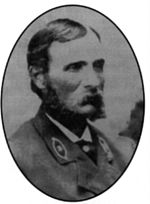Marcus Hanna (lighthouse keeper)
| Marcus A. Hanna | |
|---|---|

Marcus Hanna
|
|
| Born | November 3, 1842 Bristol, Maine |
| Died | December 21, 1921 (aged 79) |
| Place of burial | Mount Pleasant Cemetery, South Portland, Maine |
| Allegiance | |
| Service/branch | |
| Years of service | 1861-1865 |
| Rank | Sergeant |
| Unit | 50th Massachusetts Volunteer Infantry |
| Battles/wars | American Civil War |
| Awards | |
Marcus Aurelius Hanna (November 3, 1842 – December 21, 1921) was an American lighthouse keeper famous for his heroism. He is the only person in history to have received both the Medal of Honor and the Gold Lifesaving Medal. He is not to be confused with political boss Marcus "Mark" Hanna (1837-1904).
Hanna was born in Bristol, Maine, the son of the keeper of the Franklin Island Light. He spent his early years at the station before going off to sea at the age of ten. By 18 he had risen to the position of ship's steward.
When the American Civil War began, Hanna enlisted, serving in the Navy for one year before being mustered out. He spent the remainder of the war fighting with various volunteer regiments. He saw action in 1863 at Port Hudson, Louisiana while serving as a sergeant with the 50th Massachusetts Infantry. During the engagement, Hanna volunteered to carry water behind the lines to the remainder of his company. This was the heaviest action he was to see during the war and for which he later received the Medal of Honor.
After the war, Hanna was appointed keeper of Pemaquid Point Light in his hometown of Bristol, Maine in 1869. In 1873 he was transferred to Two Lights in Cape Elizabeth, Maine, where he served as head lightkeeper.
While serving at Two Lights, on January 28, 1885, that he risked his life to save two sailors from the schooner Australia which had wrecked on the rocks below the station. According to the official Coast Guard website, Hanna braved a blizzard in freezing temperatures, at the risk of his life, to throw a line to the ship which was being battered against the rocks. He successfully got both sailors off the ship and brought them to the nearby fog signal house where the sailors were able to be warmed to save them from exposure and frostbite.
...
Wikipedia
